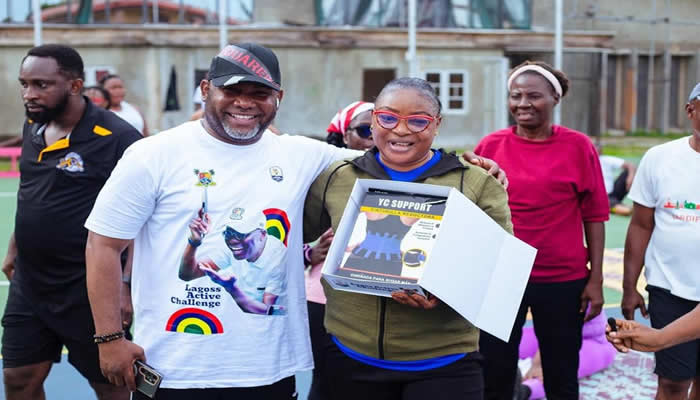The Lagos State Sports Commission has officially launched the inaugural “Lagos Active Challenge” aimed at promoting physical activity and healthier living among residents. This innovative initiative took place in five selected locations within the state, including Mobolaji Johnson Sports Centre, Rowe Park, Adekunle Ifako-Ijaiye, Isolo, and Obanikoro. The Lagos Active Challenge seeks to build on the rising awareness regarding the significance of regular exercise and its positive influence on personal health. By establishing this challenge, the commission intends to send a strong message about the benefits of fitness and stimulate community engagement in exercises designed to enhance physical well-being.
Lekan Fatodu, the Director General of the Lagos State Sports Commission, emphasized the initiative’s importance by highlighting how engagement in regular aerobic activities can significantly reduce healthcare costs. By fostering a culture of physical activity, the government aims to divert a substantial segment of the population away from health-related issues that contribute to hospital visits. Fatodu remarked on the pivotal role of exercise not only in promoting personal health but also in achieving socio-economic development within the state. He expressed the belief that when citizens are physically fit, they can perform better professionally, ensuring that they reach their full potential.
Participants in the Lagos Active Challenge expressed their appreciation for the program. Abraham Abiodun, who joined the activities at the Obanikoro location, shared that he is no stranger to exercise, as he regularly Jog from National Stadium to Maryland. His enthusiasm reflects the growing support within the community for initiatives that facilitate physical fitness. Similarly, fellow participant Hannah Oregwe conveyed her thoughts on the profound impact that regular exercise has had on her life, crediting her daughter for inspiring her to adopt a more active lifestyle. Both participants conveyed their gratitude towards Governor Babajide Sanwo-Olu, acknowledging his commitment to enhancing the welfare of citizens through initiatives that promote fitness and health.
The health benefits associated with physical activity are well-documented, and the Lagos State Sports Commission’s initiative seeks to capitalize on this knowledge by creating structured opportunities for residents to engage in exercise collectively. By offering diverse locations for the challenge, the commission aims to ensure accessibility for various demographics within the state. This strategic approach is intended not only to sway individual behavior but also to foster a community-oriented mindset focused on health and well-being. Fatodu’s assertion that the responsibility of promoting the challenge lies with all Lagosians underlies a critical societal message: health is a collective endeavor that requires community participation for maximum impact.
Fatodu’s call to action is a pivotal element of the Lagos Active Challenge, with the director general encouraging every resident of Lagos to take part in adopting a healthier lifestyle. Through this challenge, the commission hopes to raise awareness about the importance of fitness and inspire long-lasting changes in behavior. Emphasizing collective responsibility, Fatodu’s message resonates with the idea that when individuals are actively involved in their well-being, they contribute not only to their personal health but to the overall health of their communities.
As the Lagos Active Challenge unfolds, it stands to represent a significant opportunity for residents to engage in physical activity while building a supportive community around wellness and fitness. Moving forward, the challenge has the potential to become a fixture in Lagos, promoting a culture of health and accountability. The collaborative efforts of the Lagos State Sports Commission, the enthusiastic participants, and the support from government officials, including Governor Sanwo-Olu, pave the way for a healthier and more active population that prioritizes both physical fitness and the socio-economic progress of the region.














